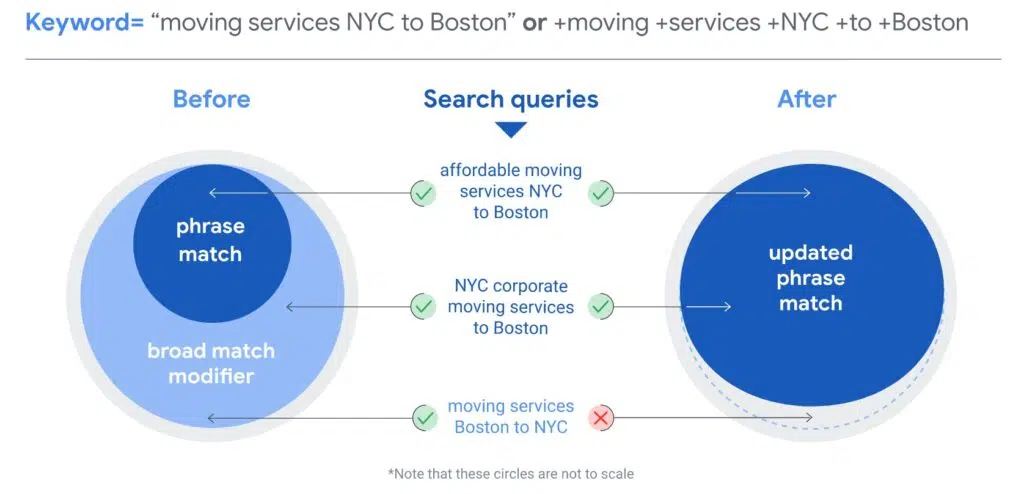
Google’s Phrase Match to Eat Up Most of Broad Match Modifier’s Traffic
The sun is about to set for broad match modifier
Google announced on Feb 4th, 2021, that phrase match keywords will expand to include a wider variety of searches with seemingly similar intent, and at the same time they will phase out support for the broad match modifier keyword. The changes are due to start rolling out on February 18th, 2021, with a little more time to prepare than Victorians had for their snap 5-day lockdown!
So what does this mean practically?
In a nutshell, if an account has phrase match keywords, they will likely see search volumes, and hopefully, conversions increase. If an account has broad match modified keywords, then these will start to be treated as phrase match keywords and will likely see traffic volumes and conversions drop off.
If an advertiser has been using broad match modifier for the keywords +moving +company +melbourne +to +sydney, Google’s algorithm may determine it is the same intent and for the search “moving company melbourne to sydney”. The ad may also show up for a search such as “moving company sydney to melbourne,” which may not be what the advertiser wants because the intent of searcher is for services in the opposite direction.
For example, in this image infographic from Google below, the updated phrase match will not show ads for searches in the opposite direction – which seems to be a good thing. As the illustration below shows, phrase match is expanding to pick up a bit of the traffic the broad match modified was working towards but not as much.

Source: Google
Below are some more examples on how this update will affect searches.
|
Broad match modifier keyword |
Queries that will no longer match after the update |
|
+resume +services |
what are some customer service skills to put on a resume |
|
+best +sneakers |
best prices on sneakers for toddler |
|
+used +printers |
companies that used daisy wheel printers |
|
Phrase match keyword |
Queries that will match after the update |
|
“holidays in zambia” |
holiday spots in zambia |
|
“long sleeve dress” |
long sleeve lace dress |
|
“womens boots” |
new womens size 37 boot |
So is this good or bad?
Well, it depends on the structure of a particular campaign, how well it is managed and the objectives. For example, we have a moving type client, where direction interstate does matter, so broad match modified was too broad and phrase match was better. But at the same time broad match modified allowed us to discover other ways searches used Google search.
>> Want expert help in managing the fast changes in Google? Book a (completely free, no strings attached) Strategy Session here. <<
For those campaigns that relied on the liberal nature of broad match modified, they will see significant drops in traffic and potentially conversions/revenue. Those with mainly phrase match-centric campaigns/ad groups, will most likely see traffic and hopefully conversion/revenue increases.
So is there anything advertisers need to do?
Google has stated in their announcement that if you have broad match modified keywords they will begin to operate like phrase match keywords, so there is no need to swap all those keywords over to phrase match. Also if you do that, then you potentially risk losing the performance history of those keywords which is not in the best interest of your account. So in most cases, best to leave them as is.
However you may want to monitor your account more carefully over the coming 3-9 months (depending on how much activity flows through your account) to monitor any anomalies in impression, click, or conversion drops for certain keywords that were broad match modified.
On the flip side, you will want to monitor the search query report more closely for phrase match keywords to ensure that the quality of searches your keywords are triggering are still relevant.
If you are using smart bidding strategies such as target ROAS, target CPA or maximise conversions/conversion value, you may want monitor and adjust how you optimise these strategies.
In summing up, this seems to be another sign that Google is doing away with keywords in search campaigns altogether (see Dynamic Search Ads with no keywords needed, limits to search query report) . It is very possible that in the next year or two, we see 100% keywordless campaigns in search ads soon, because why should Google allow advertisers to control their advertising campaigns.
If you have any comments or questions about the above or would like some expert help managing your Google Ads campaigns, get in touch with us.




